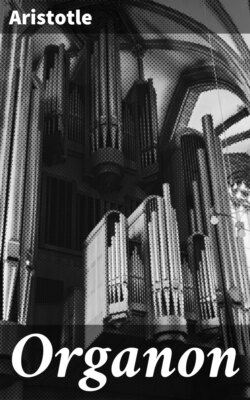Читать книгу Organon - Aristotle - Страница 15
На сайте Литреса книга снята с продажи.
Chapter 11
ОглавлениеTable of Contents
The dialectic problem is a theorem tending either to choice and avoidance, or to truth and knowledge, either per se or as co-operative with something else of this kind, about which the multitude either hold an opinion in neither way, or in a way contrary to the wise, or the wise to the multitude, or each of these to themselves. Now some problems it is useful to know, for the purpose of choice or avoidance, as whether pleasure is eligible or not, but others for knowledge only, as whether the world is everlasting or not, some again by themselves, for neither of these purposes, yet do they co-operate to something or this kind, since there are many things which we do not desire to know for themselves, but for the sake of others, in order that through these we may know something else. Moreover, those are problems also, of which there are contrary syllogisms (for they admit a doubt, whether they are so and so, because of there being credible arguments in both respects). And those about which we have no argument from their being vast, conceiving it difficult to assign their cause, e. g. whether the world is everlasting or not, for any one may investigate such things as these.
Let then problems and propositions be distinguished as we have said: a thesis, on the other hand, is a paradoxical judgment of some one celebrated in philosophy, as that contradiction is impossible, as Antisthenes said, or that all things are moved, according to Heraclitus, or that being is one, as Melissus asserted, for to notice any casual person setting forth contrarieties to (common) opinions is silly. Or (a thesis is an opinion) of things concerning which we have a reason contrary to opinions, as that not every thing which is, is either generated or perpetual, as the sophists declare, since (they say) that a musician is a grammarian, though he is neither generated nor eternal, for this, even if it be not admitted by any one, may appear to be from possessing a reason.
A thesis then is also a problem, yet not every problem is a thesis, since some problems are of such a kind, as that we form an opinion about them in neither way; but that a thesis is also a problem is evident, as it is neoesary from what we have said, either that the multitude ahould be at variance with the wise about the thesis, or one or other of these with themselves, since a thesis is a certain paradoxical judgment. Now almost all dialectical problems arc called theses, let it, however, make no difference how they are called, as we have not thus divided them from a desire to fabricate names, but that we may not be ignorant what are their real differences.
Still we need not consider every problem nor every thesis, but that which any one may be in doubt about, who is in want of argument and not of punishment or sense, for those who doubt whether we ought to worship the gods and to love our parents or not, require punishment, but those (who doubt) whether snow is white or not, (need) sense. Nor (need we discuss those things) of which the demonstration is at hand, nor those of which it is very remote, for the one do not admit of doubt, but the other, of greater (doubt) than accords to (dialectic) exercise.
